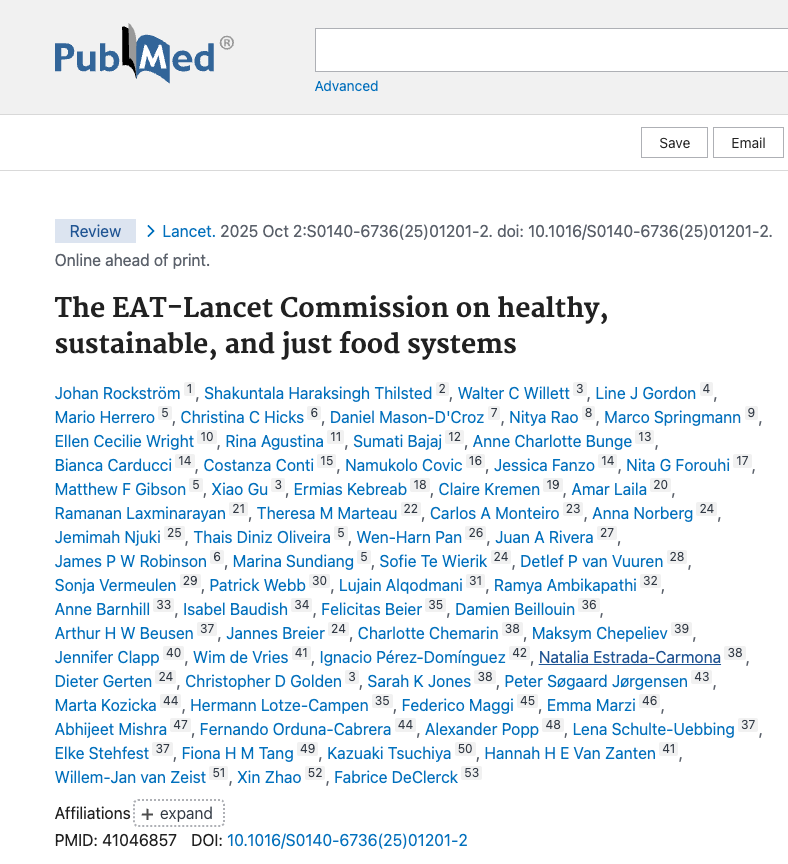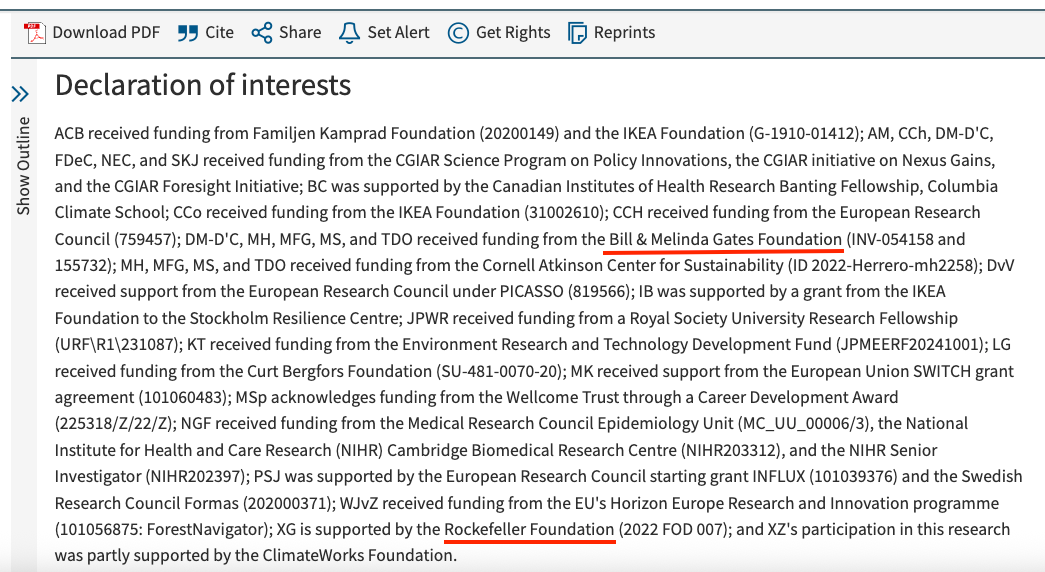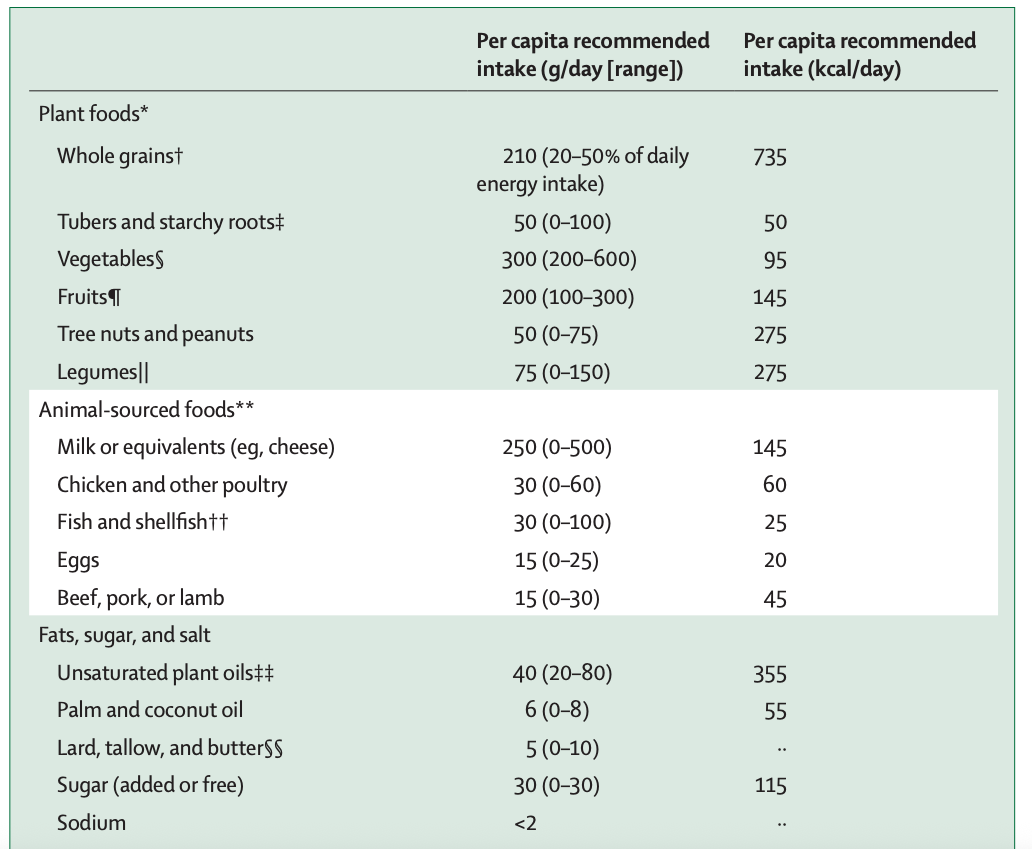
Rockefeller, Bill Gates’ Dystopian Plan to Govern the World’s Diet with ‘Great Food Transformation’: ‘The Lancet’
Demands near-elimination of meat, centralized financing worth up to half-a-trillion dollars per year, and global surveillance of food production within quantified “planetary boundaries.”
JON FLEETWOOD
A Thursday publication in The Lancet, titled “The EAT-Lancet Commission on Healthy, Sustainable, and Just Food Systems,” presents what the authors call “a great food transformation”—a coordinated global programme to reshape agriculture, diets, and financing so that every nation’s food supply fits within quantified “planetary boundaries.”
The food-system power grab comes as the same network of government agencies and Gates-funded projects are already re-engineering the genetic code of crops themselves—turning destructive plant viruses into self-replicating DNA platforms—illustrating how the push for “sustainability” and “climate-smart” agriculture doubles as a bid to centralize control over both the seeds in the ground and the food on our plates.
The new 80-page commission links its plan to the debunked “climate change”-aligned Paris Agreement, UN Sustainable Development Goals, and the Convention on Biological Diversity.
It proposes:
- worldwide limits on red-meat consumption,
- a yearly re-allocation of $200–$500 billion in farm subsidies,
- and continuous monitoring of national food systems under “science-based targets with monitoring and accountability mechanisms.”
The paper’s declared funders include the Bill & Melinda Gates Foundation, the Rockefeller Foundation, Wellcome Trust, IKEA Foundation, and Children’s Investment Fund Foundation, whose grants financed the work through the EAT Foundation in Oslo.


1. A Global Blueprint for Diet Policy
The Lancet publication argues that controlling food systems is the key to controlling every major sector—linking nutrition, climate, economics, and governance under one unified global framework.
“Food systems sit at the nexus of health, environment, climate, and justice. A food systems transformation is fundamental for solving crises related to the climate, biodiversity, health, and justice. The central position of food systems emphasises the interdependent nature of these crises, rather than each crisis separately, which highlights the need to position food systems change as a global integrator across economic, governance, and policy domains,” the paper reads.
The Commission explicitly calls for “cross-sectoral coalitions” to implement its totalitarian framework worldwide.
The authors claim that “[u]nprecedented levels of action are required to shift diets.”
The implication is clear: by redefining food as the central lever for solving global crises, the Commission positions international authorities and private foundations to influence or direct national policies far beyond agriculture itself.
In practical terms, this dystopian vision turns food policy into a mechanism for global management—where unelected institutions, under the banner of sustainability, unilaterally dictate how nations farm, trade, and eat.
It reads less like a nutrition framework and more like the blueprint for a top-down, totalitarian system of control over the most basic human necessity.
2. Who Funds and Pushes It
According to the EAT Forum’s own statements and the Lancet’s “Funding” disclosure section, the Commission received financial support from several large so-called philanthropic foundations and partner institutions.
The report states that it was “supported by the Wellcome Trust, the Rockefeller Foundation, the IKEA Foundation, and the Children’s Investment Fund Foundation (CIFF).”
These organizations provided the resources that allowed the EAT-Lancet 2.0 Commission to conduct its multi-year research and publish the October 2025 update.
Together, these foundations underwrite the EAT Foundation, based in Oslo, which coordinates partnerships among UN agencies, academics, and private organizations to promote what the Commission calls “bundles of actions” to reshape global food production and consumption.
3. The Planetary Health Diet: Severe Limits on Animal Foods
The Commission’s reference diet prescribes:
- Beef, pork, or lamb 15 g per day (≈ one serving per week)
- Poultry 30 g per day (≈ two servings per week)
- Milk or equivalents 250 g per day (≈ one cup).
Adopting these values globally would mean large-scale contraction of livestock sectors and a universal shift toward plant-based production.

4. Financial Realignment on a Massive Scale
“Substantial financial resources, estimated between US $200 billion and $500 billion per year, are needed to support the transformation… Existing investments can be repurposed by realigning incentives with goals,” the paper reads.
The plan frames these sums as essential to remake supply chains and redirect subsidies, predicting “≈ $5 trillion per year” in long-term benefits.
Such sweeping financial reengineering would coerce entire nations into compliance with a plant-based food regime.
This would effectively punish farmers, collapse the livestock economy, and promote nutritionally deficient diets that deprive billions of critical animal-derived proteins, fats, vitamins B12 and D, heme iron, and essential amino acids necessary for immune, hormonal, and neurological health.
5. ‘Planetary-Boundary’ Accounting & Global Monitoring
“For the first time, we quantify the global food system’s share of all nine planetary boundaries… Mechanisms should be established to shield policy making from undue corporate influence, and civil society and social movements have an important role in promoting transparency and oversight.”
The Commission’s “food-system boundaries” would assign each country a numerical share of land, water, nutrient, and emission use—data to be tracked against a global ledger.
6. Justice as an Operational Metric
“Nearly half of the world’s population falls below these social foundations… Just 1 % of the global population is in a safe and just space.”
Governments are urged to “address inequities in the distribution of benefits and burdens of current food systems.”
Linking compliance with social-equity metrics effectively turns diet policy into a governance instrument measuring fairness as well as nutrition.
By framing food production and consumption within climate-justice rhetoric, the Commission turns the now-debunked theology of global warming into a moral cudgel—one used to justify worldwide economic restructuring and to consolidate control over what people are permitted to eat.
7. Even Full Compliance Falls Short
“Even with these ambitious transformations …the world is barely able to return to the safe space for freshwater use and climate change, and continues to transgress the biogeochemical boundary for nitrogen and phosphorus.”
Despite acknowledging this limitation, the authors call for “unprecedented levels of action.”
Bottom Line
The EAT-Lancet Commission envisions more than nutritional guidance.
It proposes a unified global framework to remake farming, finance, and diet around quantified “planetary” rules.
Its backers—the Rockefeller, Wellcome, IKEA, and CIFF foundations, alongside Gates-funded programmes—supply the money and institutional reach to promote it through UN channels.
By the Commission’s own wording, this transformation would entail worldwide diet targets, a half-trillion-dollar financial redirection, and continuous monitoring of nations’ food systems.
It seeks to standardise what humanity eats, how it farms, and how that compliance will be measured.
The timing is not accidental.
The food-system agenda surfaces just as federal agencies and Gates-financed laboratories are rewriting the genetic code of crops through self-replicating viral platforms—proof that the same ideology driving “climate-smart” food policy is now reaching into the DNA of the food supply itself, consolidating control from seed to plate.
This article (Rockefeller, Bill Gates’ Dystopian Plan to Govern the World’s Diet with ‘Great Food Transformation’: ‘The Lancet’) was created and published by Jon Fleetwood and is republished here under “Fair Use”

••••
The Liberty Beacon Project is now expanding at a near exponential rate, and for this we are grateful and excited! But we must also be practical. For 7 years we have not asked for any donations, and have built this project with our own funds as we grew. We are now experiencing ever increasing growing pains due to the large number of websites and projects we represent. So we have just installed donation buttons on our websites and ask that you consider this when you visit them. Nothing is too small. We thank you for all your support and your considerations … (TLB)
••••
Comment Policy: As a privately owned web site, we reserve the right to remove comments that contain spam, advertising, vulgarity, threats of violence, racism, or personal/abusive attacks on other users. This also applies to trolling, the use of more than one alias, or just intentional mischief. Enforcement of this policy is at the discretion of this websites administrators. Repeat offenders may be blocked or permanently banned without prior warning.
••••
Disclaimer: TLB websites contain copyrighted material the use of which has not always been specifically authorized by the copyright owner. We are making such material available to our readers under the provisions of “fair use” in an effort to advance a better understanding of political, health, economic and social issues. The material on this site is distributed without profit to those who have expressed a prior interest in receiving it for research and educational purposes. If you wish to use copyrighted material for purposes other than “fair use” you must request permission from the copyright owner.
••••
Disclaimer: The information and opinions shared are for informational purposes only including, but not limited to, text, graphics, images and other material are not intended as medical advice or instruction. Nothing mentioned is intended to be a substitute for professional medical advice, diagnosis or treatment.
Disclaimer: The views and opinions expressed in this article are those of the author and do not necessarily reflect the official policy or position of The Liberty Beacon Project.






I won’t be going to IKEA for a coffee anymore